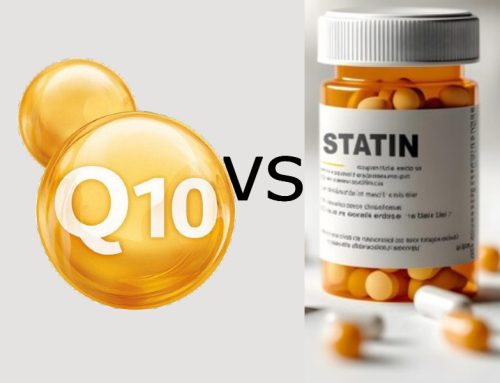SIRT1 blood levels increased significantly in senior citizens taking a daily supplement combination of 200 mg of Coenzyme Q10 and 200 mcg of selenium for four years. At the same time, SIRT1 blood levels in a parallel placebo group decreased significantly. Furthermore, the study participants who died from cardiovascular disease causes during the ten-year follow-up had significantly lower SIRT1 concentrations at baseline than did the survivors [Opstad 2023].

Harvard Medical School professor Dr. David Sinclair has written about sirtuin activators and inhibitors [Dai, Sinclair, et al 2018]. Combined supplementation with Coenzyme Q10 and selenium have been shown to increase blood levels of SIRT1. Together, Coenzyme Q10 and selenium may increase the levels of NAD+, an essential substrate for the sirtuins [Opstad 2023].
In earlier scientific papers, the KiSel-10 Study researchers had reported evidence that the combined supplementation was associated with significantly reduced cardiovascular disease mortality, with significantly improved cardiac function, and with significantly reduced levels of oxidative stress and systemic inflammation [Alehagen 2013; Johansson 2015; Alehagen 2015 Nov-Dec: Alehagen 2015 Sep].
Why Are Sirtuins and Telomeres Important?
Sirtuins, i.e., SIRT1-SIRT7, are a group of seven enzymes that are involved in cell metabolism and involved in the regulation of such cellular functions as DNA repair, inflammatory response, cell cycle, and apoptosis. There is a strong connection between sirtuin expression and biological aging and longevity [Watroba 2017].
SIRT1 is the most studied of the seven sirtuins. It seems to stabilize the ends of telomeres. It is involved in glucose metabolism, regulation of insulin sensitivity, and autoimmunity, among other biological functions [Opstad 2021].
Telomeres are segments of DNA that function like caps on the ends of chromosomes. They protect the ends of chromosomes from becoming damaged. However, every time cells divide, the telomeres become a little shorter. After many cell divisions, the telomeres are so short that the cells can no longer divide successfully, and the cells die [Telomere 2023].
Scientific studies have shown a relationship between telomere length and the risk of cardiovascular disease mortality. Moreover, researchers have observed an association between the levels of the longevity factor SIRT1 and leukocyte telomere length [Opstad 2021].
CoQ10 and Selenium Supplementation as an Epigenetic Factor
Research studies show that epigenetic modifications contribute to human health and disease and to longevity and biological aging. Epigenetic modifications of DNA involve changes in gene expression and activity but do not involve changes in the DNA sequence itself [Watroba 2017].
The recent results from the KiSel-10 study suggest that CoQ10 and selenium intakes and status are epigenetic factors delaying and possibly even reversing the process of biological aging [Opstad 2023; Opstad 2022].
Low levels of Coenzyme Q10 and Selenium in Elderly Individuals
At the start of the study, the elderly KiSel-10 study participants, average age: 76 years, were notably low in Coenzyme Q10 and selenium [Alehagen 2020]. This was not surprising: selenium intakes are known to be low in much of Europe [Stoffaneller & Morse 2015], and the body’s bio-synthesis of Coenzyme Q10 is known to decrease with increasing age [Kalén 1989].
- After 48 months, the supplementation increased serum selenium levels from 67.1 mcg/L (deficiency level) to 210.3 mcg/L, on average.
- After 48 months, the supplementation increased the serum CoQ10 levels from a low of 0.82 mg/L to 2.17 mg/L, on average.
Conclusion: Coenzyme Q10 and Selenium and SIRT1
SIRT1 appears to be involved in cardiac metabolism and health [Opstad 2023].
SIRT1 activity is dependent upon the availability of nicotinamide adenine dinucleotide (NAD+). NAD is a co-substrate of sirtuins.
NAD+ levels tend to decrease with increasing age. Some studies indicated that intervention with Coenzyme Q10 and selenium can increase the levels of NAD+ [Opstad 2023].
Four years of combined supplementation with Coenzyme Q10 and selenium is associated with significantly increased SIRT1 concentrations, significantly less telomere shortening, and significantly reduced cardiovascular disease mortality [Opstad 2023; Opstad 2022].
We need more research into the interrelationships between Coenzyme Q10 and selenium and sirtuins and epigenetics and longevity.
Sources
Alehagen U, Johansson P, Björnstedt M, Rosén A, Dahlström U. Cardiovascular mortality and N-terminal-proBNP reduced after combined selenium and coenzyme Q10 supplementation: a 5-year prospective randomized double-blind placebo-controlled trial among elderly Swedish citizens. Int J Cardiol. 2013 Sep 1;167(5):1860-6.
Alehagen U, Aaseth J. Selenium and coenzyme Q10 interrelationship in cardiovascular diseases–A clinician’s point of view. J Trace Elem Med Biol. 2015;31:157-62.
Alehagen U, Aaseth J, Johansson P. Less increase of copeptin and MR-proADM due to intervention with selenium and coenzyme Q10 combined: Results from a 4-year prospective randomized double-blind placebo-controlled trial among elderly Swedish citizens. Biofactors. 2015 Nov-Dec;41(6):443-52.
Alehagen U, Lindahl TL, Aaseth J, Svensson E, Johansson P. Levels of sP-selectin and hs-CRP Decrease with Dietary Intervention with Selenium and Coenzyme Q10 Combined: A Secondary Analysis of a Randomized Clinical Trial. PLoS One. 2015 Sep 16;10(9):e0137680.
Alehagen U, Aaseth J, Alexander J, Johansson P. Still reduced cardiovascular mortality 12 years after supplementation with selenium and coenzyme Q10 for four years: A validation of previous 10-year follow-up results of a prospective randomized double-blind placebo-controlled trial in elderly. PLoS One. 2018 Apr 11;13(4):e0193120.
Alehagen U, Aaseth J, Alexander J, Johansson P, Larsson A. Supplemental selenium and coenzyme Q10 reduce glycation along with cardiovascular mortality in an elderly population with low selenium status – A four-year, prospective, randomised, double-blind placebo-controlled trial. J Trace Elem Med Biol. 2020 May 4;61:126541.
Dai H, Sinclair DA, Ellis JL, Steegborn C. Sirtuin activators and inhibitors: Promises, achievements, and challenges. Pharmacol Ther. 2018 Aug;188:140-154.
Johansson P, Dahlström Ö, Dahlström U, Alehagen U. Effect of selenium and Q10 on the cardiac biomarker NT-proBNP. Scand Cardiovasc J. 2013 Oct;47(5):281-8.
Kalén A, Appelkvist EL, Dallner G. Age-related changes in the lipid compositions of rat and human tissues. Lipids. 1989 Jul;24(7):579-84.
Opstad TB, Berg TJ, Holte KB, Arnesen H, Solheim S, Seljeflot I. Reduced leukocyte telomere lengths and sirtuin 1 gene expression in long-term survivors of type 1 diabetes: A Dialong substudy. J Diabetes Investig. 2021 Jul;12(7):1183-1192.
Opstad TB, Alexander J, Aaseth JO, Larsson A, Seljeflot I, Alehagen U. Selenium and Coenzyme Q10 Intervention Prevents Telomere Attrition, with Association to Reduced Cardiovascular Mortality-Sub-Study of a Randomized Clinical Trial. Nutrients. 2022 Aug 15;14(16):3346.
Opstad TB, Alexander J, Aaseth J, Larsson A, Seljeflot I, Alehagen U. Increased SIRT1 concentration following four years of selenium and Q10 intervention associated with reduced cardiovascular mortality at 10-year follow-up—sub-study of a previous prospective double-blind placebo-controlled randomized clinical trial. Antioxidants. 2023;12:759.
Stoffaneller R, Morse NL. A review of dietary selenium intake and selenium status in Europe and the Middle East. Nutrients. 2015 Feb 27;7(3):1494-537.
Telomere. National Human Genome Research Center. Genome.gov. 2023, February 23. Retrieved from https://www.genome.gov/genetics-glossary/Telomere.
Wątroba M, Dudek I, Skoda M, Stangret A, Rzodkiewicz P, Szukiewicz D. Sirtuins, epigenetics and longevity. Ageing Res Rev. 2017 Nov;40:11-19.
The information presented in this review article is not intended as medical advice and should not be used as such.








Leave A Comment